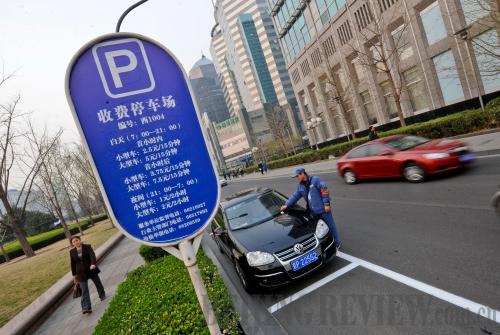|
 |
|
NEW MEASURE: Beijing has raised parking fees since April 1, in order to ease traffic congestion in the city (XINHUA) |
Off-the-Books Income
From April onward, Wuhan Municipal Government civil servants will have to hand back various allowances and subsidies given to them between 2007 and 2009.
Last year, six ministries and departments including the Central Commission for Discipline Inspection of the Communist Party of China, conducted an investigation into civil servants' allowances and subsidies in six cities including Guangzhou and Wuhan. Secret payments of allowances and subsidies of various amounts were discovered during the investigation. The money came mainly from extra-budgetary revenues, so the payments had not only disturbed regular budgetary order, but also made supervision difficult. Worse still, this may have created favorable conditions for officials' corruption.
Meanwhile, excessive allowances are widening the income gap between civil servants and ordinary workers, damaging government image and increasing the public's dissatisfaction with the government.
Such kind of occasional inspection is unable to curb excessive allowances and subsidies in local governments, because this is already a common phenomenon around the country. Because the current Civil Servant Law of China has only general and loose regulations on civil servants' salary welfare, local governments try their best to take advantage of these loopholes to win as many allowances and subsidies as possible, beyond the budget.
Why does this phenomenon prevail around the country, despite the public's criticism? The fundamental reason is the absence of a standard, clearly defined and effective law to rein in civil servants' excessive welfare.
China Youth Daily
Visitor Limitation
From April 30 to May 2, the Palace Museum in Beijing imposed a daily limit on tourist numbers, putting the allowed maximum at 80,000. To limit the number of visitors during a tourism peak season is a reasonable step forward in management. While the overall tourist number was limited, the museum was under much less pressure than usual. Visitors were also able to have much more fun in the museum.
Throughout the country, scenic spots always tend to be overcrowded on holidays. This situation not only throws the tourist sites into chaos but also damages historical relics and the natural environment. Sometimes, the damage is irreparable. Given the severity of the reality, to limit tourist numbers during peaks was particularly urgent and necessary.
There is no lack of similar examples. The Hong Kong Disneyland has adopted a limit measure since its opening. Compared to some scenic spots that choose to increase ticket prices during peaks to make more profit, the Palace Museum's practice seems a bit "silly." Some people think it will lose an opportunity to make big money. But, the Palace Museum obviously has understood tourism is a comprehensive industry and ticket income is not the only measure of success.
As we know, tourism is related to many other sectors, such as catering, transport and hotels. Getting rid of the old concept of ticket economy is a farsighted strategy.
Xinmin Evening News
Vegetable Prices
A "fair price vegetable shop" was opened on April 30 in Zunyi, southwest China's Guizhou Province, the first of its kind in the city. The vegetables sold there are much cheaper than those in most supermarkets.
Vegetable prices matter a lot in the public's daily life. This "fair price shop," which sells vegetables at a 15 percent discount of market price, is naturally warmly embraced by local residents. It's a pity this shop sells only around 250 kg of vegetables every day, unable to meet people's huge demand.
But we need to think: Can this shop sustain? Is the pattern widely replicable around the country? Why is this shop able to sell cheap vegetables? There are mainly three factors helping to greatly cut the costs of the shop: The vegetables are transported directly from where they are grown; the owner of the shop does not need to pay rental fees; and sellers are all nearby community residents and volunteers.
So, we conclude that, as long as the government is determined, the shop is replicable. Of the three factors, only the third one is a bit difficult to deal with. One thing is certain: As long as the government chooses to put people's livelihood first and will make efforts to improve it, issues like vegetable prices will never be a tough problem.
Yanzhao Evening News
Parking Fees
A month after Beijing began to raise parking fees, "how is the government spending the charged money" and "how much has the government charged" are now becoming hot topics.
Statistics of the Finance Bureau of Beijing said, in 2010, parking fee charges in the city amounted to 21.1 million yuan ($3.25 million).
But the departments concerned have never informed the public of how the money will be spent. The Finance Bureau said the fee would be used for the general budget, which means it might be allocated to other items such as housing or education.
Parking fees are extra charges added to normal taxation. This revenue is from car owners, so naturally, it's expected to be spent on transport improvement, so car owners may enjoy smoother traffic service after paying extra fees.
Many car owners are not happy with the raised parking fees, and one reason is they don't know where the parking expenses go. If this trend continues, not only will the car owners feel they are deprived of the right to information, but government policies may also meet greater resistance from the public.
The Beijing News | 